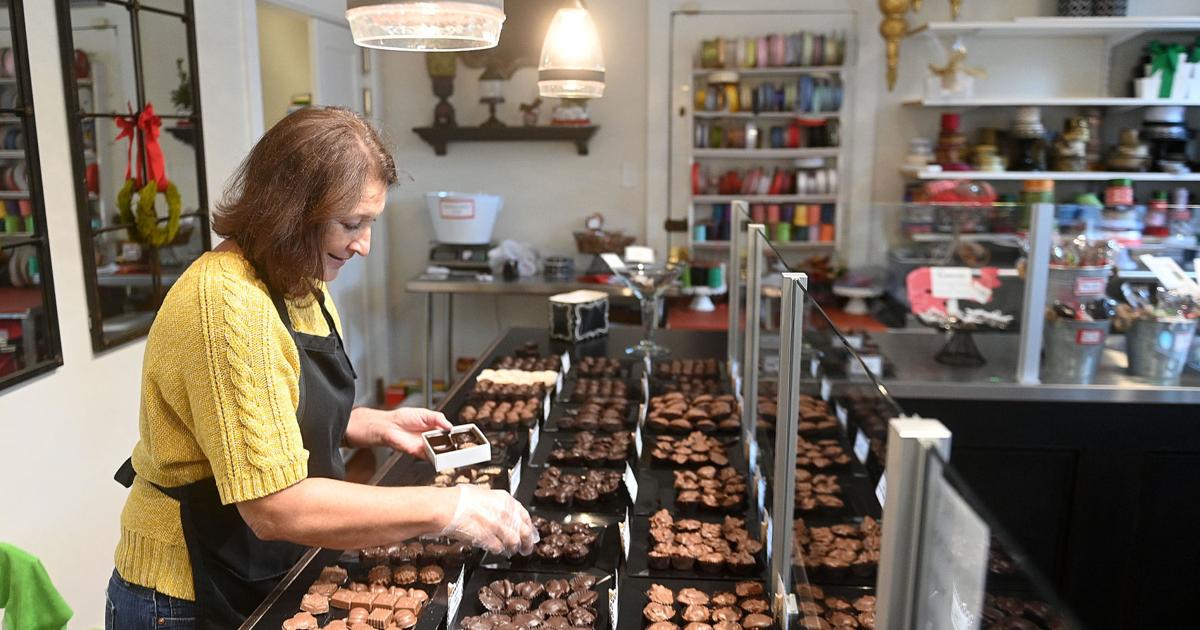[ad_1]
November 27th is the second small business Saturday since the COVID-19 pandemic turned the global economy on its head – and for small businesses in the Carlisle area, the roller coaster ride isn’t over yet.
For some, demand must have returned to pre-pandemic levels; for others, demand is now stronger while supply has stalled as global shipping and manufacturing struggle to get back on their feet. For workers, the labor market offers the opportunity to be selective with their employers as job changes are still at an all-time high.
Small Business Saturday, especially in downtown Carlisle, is usually one of the busiest days of the year for local businesses and a flagship for the economic situation.
“It’s been two very difficult years,” said Judy McCarren, who opened the Sanctuary Boutique in September 2019, five months before the pandemic broke out. “At the moment we just hope this weekend gives us a boost.”
Sales appeared to be recovering quickly after many pandemic restrictions were lifted in late 2020, but then began to ease again last summer, said McCarren, a pattern cited by several retailers. Customer traffic in the past few days has started to recover, McCarren said, giving a glimmer of hope.
People also read …
The small apparel and accessory makers she buys from don’t seem to have been affected much, McCarren said, but the paper bags she uses in her store have been delayed by 13 months, one of many auxiliary items that seem to have dried up are due to supply chain issues.
“There is certain packaging that I still can’t get,†says Lana West, owner of Mummert Chocolates. “It’s just strange things that you wouldn’t even think of.”
The shredded candy canes she uses for certain Christmas items will not be made this year due to residue, West said, and the lack of ingredients has put a damper on some of their chocolate confections.
“A lot of the little one-of-a-kind things I would get just won’t happen this year,” West said.
The industry has also seen intermittent delays from processors supplying the base chocolate that is at the core of every recipe – COVID outbreaks regularly close some chocolate processors who are now saying they are struggling to get employees to return, West said.
The problem is even more diverse for companies like Knisley’s Pet & Farm Center, where owner Steve Knisley is still waiting for tomato cages that he ordered in December 2020.
“A lot of the suppliers we deal with can’t get materials, so they can’t,” said Knisley.
For example, demand for recycled plastic patio furniture has been booming, Knisley said. But the manufacturers Knisley shops from, all of whom live in Pennsylvania, cannot get plastic sheets due to bottlenecks in other parts of the country or even in other parts of the world.
“I’ve been with these guys for years, but the demand has increased and they can’t get material,” said Knisley. The delivery time for outdoor furniture has now increased to 30 weeks.
On the other hand, Knisley said he was able to get some items when his big and online competitors couldn’t. Sales of pet staples like canned cat food in Knisley’s store have increased as online sellers experienced inventory delays.
“Clog your chains while our source with another distribution chain we can get them,” said Knisley.
While supply bottlenecks are a headache for many entrepreneurs, the current labor market is a blessing for workers. With low unemployment and a labor pool still well below pre-pandemic levels, workers have had the opportunity to change jobs in an unprecedented location.
According to federal data, termination rates peaked at 3% in September, and retail and hospitality job rates were even higher at 4.4% and 6.4%, respectively.
Average weekly wages for non-supervisory hospitality workers rose 13.2% in October from its pre-pandemic peak in February 2020. For this retail sector, these earnings have increased by 12.5%, outperforming consumer prices despite a comparatively high inflation rate of 6.9% over the same period.
A local employee, a college student, quit her job at a low-paying pizzeria that was leaving in droves, she said. Today she works for two small retailers that offered significantly better wages and working conditions.
“During school I just wanted to have a better place,†she said, and that wasn’t difficult in the current job market.
Some companies have been able to protect themselves from delivery bottlenecks by simply planning ahead and providing lots of cash upfront, like Jeff Wood, owner of Whistlestop Bookshop.
“We were warned about this in the book industry in late summer,” said Wood. “If you take these warnings seriously and do something about it, having invested extra money upfront by ordering more than you should have, everything will be fine.”
Wood said he had read the tea leaves correctly so far. He took extra copies of Paul McCartney’s Lyrics, for example, and the book’s publisher is now sold out, telling retailers that printers won’t be able to make another edition of the huge two-volume set until March.
“Customers are actually paying attention and doing their Christmas shopping early and that’s great,” said Wood. “Everyone is kind of nervously positive.”
For businesses that have spent nearly two years generating profit margins or even losses, Small Business Saturday is a lifeline.
At Kindred Kaboodle, an arts and crafts gallery, owner Even Webster said sales were spotty as some artists were sold out and too busy to provide more items, while other inventory was moving more slowly than it was a year ago. With consumer confidence still weak, Webster is nervously hopeful.
“I wonder if people are now reluctant to spend money on art,” said Webster. “But I’m optimistic for Saturday.”
Send an email to Zack at [email protected].
[ad_2]

